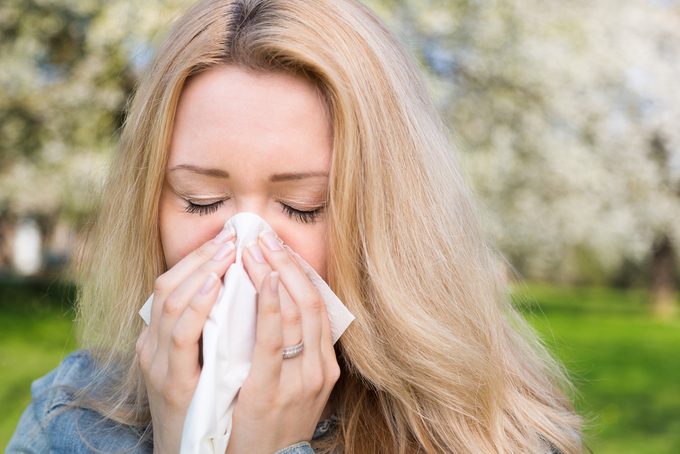What Do Food Sensitivities Have To Do With Seasonal Allergies?
We asked two experts for their advice on dealing with seasonal allergies

The Holistic Nutritionist says…
Some people who suffer from allergies also have food sensitivities, so testing and eliminating these foods can reduce the allergic burden on your immune system throughout the year. My priority is to find underlying issues that are causing allergic reactions. We shouldn’t be “allergic” or sensitive to trees, grasses and pollens if our mucous membrane defence system is intact and functioning optimally.
Mucous membranes throughout the body protect against allergy symptoms by preventing pollen from entering into deeper tissues. Allergens irritate by getting through these barriers, also known as the microbiome, which causes inflammation and the histamine response. By strengthening and repairing the microbiome, springtime allergies can be greatly reduced or eliminated altogether.
Prevent springtime allergies in late winter and early spring before symptoms appear to allow the body some time to build up its defences. Eliminate known food sensitivities, and avoid sugar, salt and processed foods, as they weaken the immune system and contribute to allergic reactions come spring.
Treating symptoms can be done with natural antihistamines. Vitamin C and essential fatty acids, such as flaxseed, evening primrose, borage and blackcurrant oil, can be taken daily in supplement form. Talk to your natural healthcare practitioner about dosages.
A saltwater nasal rinse can help the body get rid of bacteria, viruses and other irritants. It’s important to heal the underlying issue of weak barriers to resolve allergies rather than just treat the symptoms with drugs.
Marlene Marshall is a holistic nutritionist in Markham, ON
The Pharmacist says…
Prevention is key to managing symptoms, so the most obvious solution is to avoid exposure from the get-go. The best way to do this is to check your weather forecast for the pollen count and stay indoors if it’s high. If avoiding the outdoors is impractical or ineffective, consider pharmacological therapy.
First-line treatment of springtime allergies is divided into two classes. First-generation treatment involves a product like Benadryl and is used for mild cases of seasonal allergies. It offers rapid relief but is only effective for a few hours. If you react to pollen with itchy, watery eyes, itchy skin or hives, this is your best bet. Second-generation treatment is a class of drugs that includes medications like Reactine and Claritin. They are most commonly used because they have fewer side effects, such as dry mouth, but they need to be taken daily throughout the season, not just when symptoms flare up.
Nasal sprays are also an option for targeted treatment. A sodium cromoglycate spray like Rhinaris-CS should be used before exposure to allergens and continue throughout the season. If the treatment begins after allergen exposure, relief may be delayed up to four weeks. To alleviate congestion, a nasal decongestant like Otrivin is best for short-term relief, like on a high-pollen-count day.
If none of these over-the-counter options works for you, a prescription nasal corticosteroid like Flonase may be more effective than other antihistamines and nasal sprays. This is the drug of choice for moderate, severe or persistent symptoms, as well as for mild symptoms that don’t respond to antihistamines.
Elaine Tam is a Shoppers Drug Mart pharmacist in Toronto
Related:
• The Worst Canadian Cities for Allergies
• 8 Things the Colour of Your Food Actually Reveals
• 10 Ways to Sleep Better During Allergy Season




